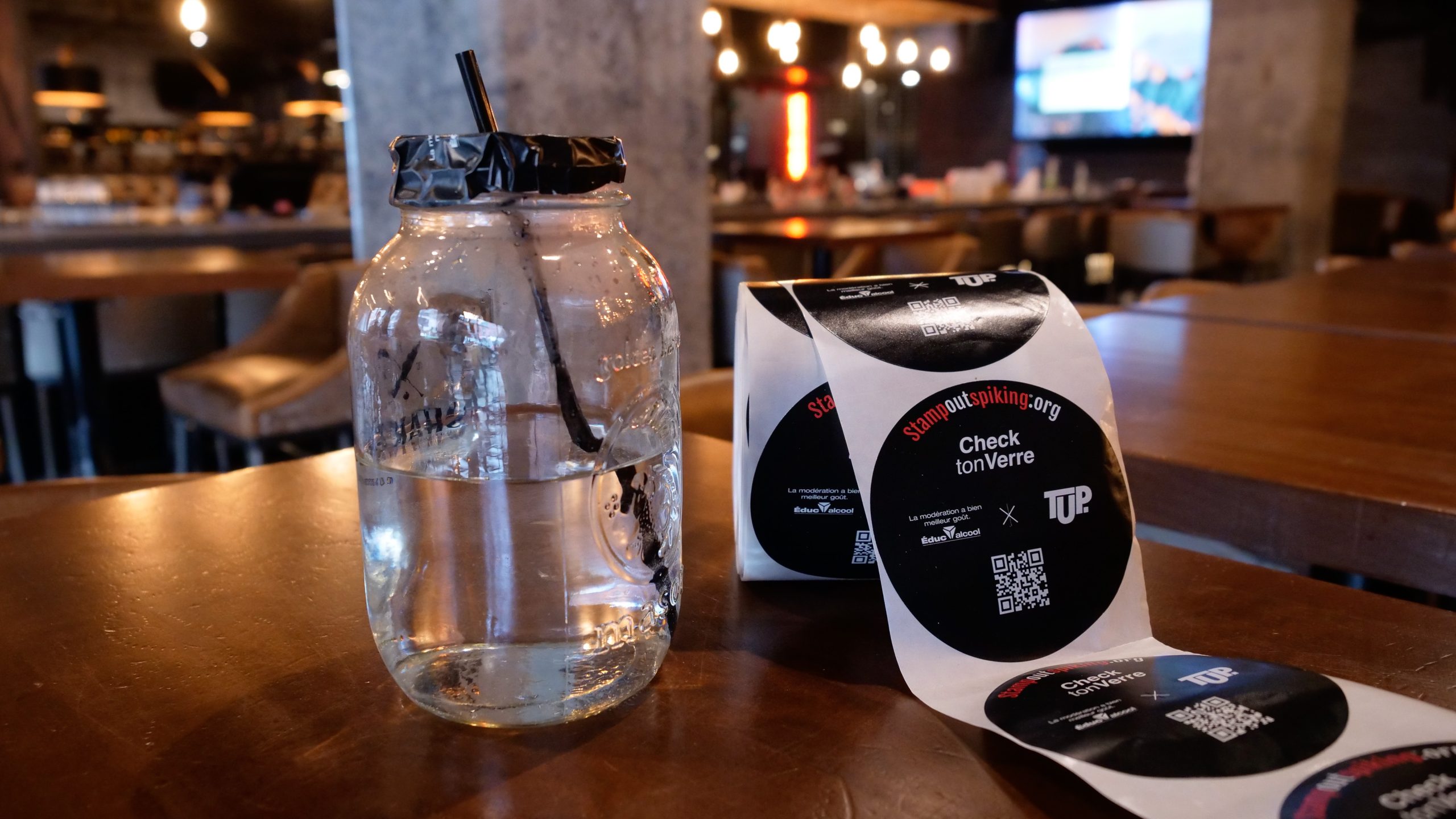‘Good first step’: Victim of drink spiking supports glass covers project, but criticizes name
Posted April 23, 2023 4:27 pm.
Last Updated April 23, 2023 6:58 pm.
Sandrine Pelletier believes she was a victim of drink spiking in January.
The 19-year-old woke up with no recollection of the night she went bar hopping with friends, despite feeling sober right before.
“Apparently I went to the bathroom and my friend followed me in the bathroom,” said Pelletier.
“I stayed in the cabin for like 15 minutes and she called my name a couple of times and I didn’t answer. So she went in and I was like half asleep, half conscious.”
While statistics are hard to come by, the problem of drink spiking is prevalent enough that non-profit Éduc’alcool and the SPVM rolled out a new pilot project this week to tackle involuntary intoxication and overconsumption in general.
“The SPVM called us in and said, ‘you know what? We have a problem,’” recalled Éduc’alcool’s general director Geneviève Desautels, who added bar owners also expressed concern about alcohol overconsumption.
Glass protective covers will be available in some bars in Montreal in hopes of keeping drinks safe from illegal substances like GHB, known as the date rape drug.
About 10,000 drink covers were distributed for free as part of the “Check ton verre” campaign on Thursday night.

A mason jar with the “Check Ton Verre” aluminum cover in a Montreal bar on April 23, 2023. (Diona Macalinga/CityNews)
The project was a collaboration with two young entrepreneurs from Quebec City who developed the recyclable aluminum drink covers.
“It’s to reduce, of course, the involuntary intoxication and to reduce the overconsumption of alcohol, especially through shooters,” said Desautels. “Because people say ‘if I take my shooter, I will not have to protect my glasses. It will be empty at the end.’”
The drink covers have individual QR codes that allow people to track their blood alcohol level. It asks the user to answer some questions like what they ate before drinking, how much they weigh, and the kind of alcohol they plan on drinking.
“The true problem for Éduc’alcool, behind all that, it’s that people take more and more shooters,” said Desautels. “Shooters always existed, but now it’s why we take shooters. We take shooters not to have to protect our glass, to check our glass. So it increases the overconsumption of alcohol.”
More needs to be done, says Pelletier
After Pelletier’s story came out, many women reached out to her with similar experiences of having an illegal substance slipped unknowingly into their drinks.
“It’s a good first step in finding solutions for this problem,” said Pelletier of the protective covers.
But she feels much more needs to be done. One suggestion is to make tests for GHB and other date-rape drugs more readily accessible.
So far there isn’t a study on drink spiking in Montreal, with Éduc’alcool saying statistics are hard to collect.
“The problem now is that police… don’t see how much this happens,” said Pelletier.
“The tests have to be more accessible to people because that’s how we’re going to have proof that this is a real problem. That’s how we’re going to put it on paper.”
Check ton verre: victim blaming?
Another big issue for Pelletier is the name of the project itself – “Check to verre” – and what it could imply.
“I think they could have chosen a better name,” she told CityNews. “The project is named ‘Check ton verre’ and it’s basically look out for your glasses. It’s like a message towards the victims.
“It’s a sentence we hear very often. And often, it causes victims to feel like they shouldn’t have done something in the moment or it’s their fault that this happened to them.”
The name was also criticized by many on social media for the same reason.
Québec solidaire’s Manon Massé called the name downright insulting.
J’avais pourtant insisté auprès du ministre sur le fait que sa campagne ne devait surtout pas mettre la responsabilité sur les épaules des victimes! C’est insultant et nettement insuffisant comme réaction. #polqc
— Manon Massé (@ManonMasse_Qs) April 21, 2023
“Excuse me? Women are well aware! We are still ignoring the real problem: people who commit criminal acts by drugging others!
“I had insisted to the Minister (François Bonnardel) that his campaign should not put the responsibility on the shoulders of the victims! This is insulting and clearly insufficient as a reaction.”
Desautels acknowledges the protective covers are only one part of addressing a larger issue.
“This is not the miracle solution,” she said. “We have to add others. But let’s say instead of one or the other, one plus the other.”
Desautels says Éduc’alcool is part of the pilot project for the next six months. She hopes all bars in Quebec will deploy the drink covers.




